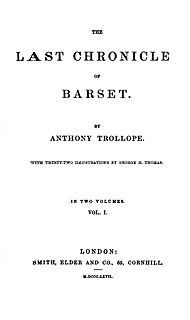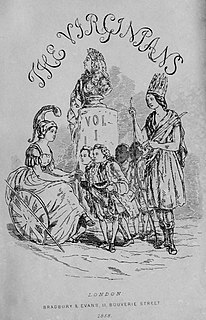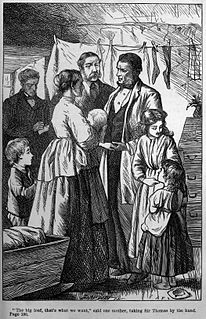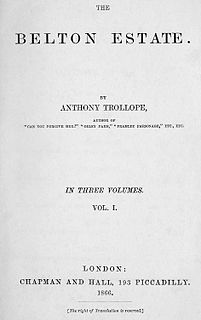 First edition title page. | |
| Author | Anthony Trollope |
|---|---|
| Country | United Kingdom |
| Language | English |
| Genre | Science fiction |
| Publisher | Blackwood’s Magazine |
Publication date | October, 1881 |
The Fixed Period (1882) is a satirical dystopian novel by Anthony Trollope.
 First edition title page. | |
| Author | Anthony Trollope |
|---|---|
| Country | United Kingdom |
| Language | English |
| Genre | Science fiction |
| Publisher | Blackwood’s Magazine |
Publication date | October, 1881 |
The Fixed Period (1882) is a satirical dystopian novel by Anthony Trollope.
It was first published in six instalments in Blackwood's Magazine in 1881–82 and in book form in 1882. In the same year there also appeared US and Tauchnitz editions of the novel. There were no further editions until 1981. [1] The Fixed Period is Trollope's only piece of dystopian writing.
Trollope was influenced in writing the book by The Old Law , a 17th-century tragicomedy written by Thomas Middleton, William Rowley, and Philip Massinger which he had read, and commented upon, in 1876. [2] The Fixed Period is set in the year 1980 in the Republic of Britannula, a fictional island in the vicinity of New Zealand, and deals with euthanasia as a radical solution to the problem of the aged. The novel takes the form of a personal account written by the President of Britannula about the island's recent history. It has frequently been remarked that when the book came out Trollope himself had reached the age of 67, the exact age at which all Britannulans are obliged by law to retire from their worldly affairs and begin a year of preparation for death.
In Trollope's novel, Britannula is a former British Crown Colony which demanded, and was granted, independence from Great Britain in the mid-20th century. Its 250,000 inhabitants [3] have, with few exceptions, retained British law and customs, and also her currency. Britannula is a thriving agrarian society whose wealth is mainly based on sheep farming and the wool trade. Its capital, Gladstonopolis, is named after 19th century British Liberal statesman and Prime Minister William Ewart Gladstone.
After independence and self-government had been gained, the Britannulans set about to organise their political system. According to the Britannulan Constitution, the Assembly, their unicameral parliament, consists of 85 Senators, who are the elected representatives of the people of Britannula. As there are hardly any differences between social classes, and as there is no aristocracy, the institutionalisation of an upper house was not deemed necessary. Also, as opposed to Great Britain, there is no capital punishment. [4] The Republic of Britannula is headed by an elected president.
The first legislative Assembly of about 30 years ago consisted mainly of young, energetic men who were eager to build a modern state. When a proposal was made to terminate citizens' lives at a fixed age to spare them undignified suffering and to help cut down on the state's expenditure on unproductive people, it got an overwhelming majority. The age was fixed at 67, at which time a citizen's "deposition" was to take place, consisting of their removal to "The College", an institution situated in the town of Necropolis, followed by their "departure", and subsequent cremation, exactly one year later, at the age of 68. No "departures" have been administered so far as none of Britannula's inhabitants has yet reached their "Fixed Period".
The concept of the New Woman has never been known to Britannulans, and there is no feminist movement to speak of. Rather, women still behave and act as if they were living in the Victorian era. They have no role whatsoever in public or business life and lead a quiet and submissive domestic existence. Sex outside marriage is not practised.
Gabriel Crasweller, a successful merchant-farmer and landowner, is Britannula's oldest citizen. Born in 1913, he emigrated from New Zealand when he was a young man and was instrumental in building the new republic as one of a group of similar-minded men which included his best friend John Neverbend, ten years his junior, who is now serving his term as President of Britannula. Whereas decades ago Crasweller also voted in favour of the law which introduced the "Fixed Period", he gradually becomes more pensive as the day of his deposition is approaching. Neverbend has long been planning that day and envisaging it as a day of triumph, believing that mankind and civilisation will move an enormous step forward towards perfection. As the originator of the idea, Neverbend also hopes that his name will go down in the annals of history as one of the great reformers. He considers it unfortunate that his friend Crasweller, as the first one to go, does not show any of the signs of old age for which "the Law" was made in the first place: Crasweller is healthy and vigorous, his mental abilities have not started to deteriorate in any way, and accordingly he is more than capable of managing his own affairs and of earning his living.
When all of a sudden Crasweller starts lying about his age and claiming that he was in fact born a year later, Neverbend realises that measures must be taken to ensure the smooth execution of the Law. However, he soon finds out that it has dawned on other elderly citizens as well what the state has in store for them, and that various individuals have come up with all kinds of excuses and plans as to how they are going to oppose their deposition and, eventually, departure. He finds a supporter in Abraham Grundle, one of the young Senators, but is shocked when he realises that Grundle, who is engaged to Crasweller's daughter Eva, only wants to inherit his friend's fortune as soon as possible. But despite this setback, and although both his own son Jack and his wife Sarah turn against him, Neverbend, who has long since passed the point of no return, considers it his duty as President and law-abiding citizen to have Crasweller deposited.
As a man of honour, Crasweller finally yields to Neverbend's arguments and stoically accepts his fate. However, on the very day of his deposition the carriage that is to transport the two men to the College is held up in the streets of Gladstonopolis by British armed forces. They have arrived on a warship of enormous dimensions and, by threatening to destroy the whole city with their "250-lb swivel gun", compel Neverbend to release Crasweller and eventually to step down as president. Britannula is re-annexed by Great Britain, a Governor is installed, and John Neverbend is forced to return to England with them.
During the passage Neverbend commits to paper the recent history of Britannula, finishing it only two days before his arrival in England. He plans to write another, more theoretical book on the "Fixed Period" and to preach to the English about this necessary step in the progress of mankind. However, he realises that he does not really know whether he will be treated with respect in the old country, or whether he will ever be able to return to Britannula.
Raymond Carr notes that
the publication of the book shocked a public accustomed to find in Trollope the chronicler of contemporary social life. [...] It is an essay in science fiction. Technology will produce 250-lb "swivel guns" that can destroy a city. Naval officers are equipped with mobile (hair) phones. The inhabitants ride steam tricycles, cricketers employ "a mechanical steam bowler." But he was no H. G. Wells. The Britannulans still go round in horse-drawn carriages. [5]
In the field of transportation, generally, the absence of any airborne vehicles is quite striking: when the British cricket team travels to Britannula they do so on a steam ship, and it takes them several weeks to reach their destination. In telecommunications, apart from the above-mentioned "hair telephone," "water telegrams" and a "reporting-telephone apparatus" – all of which were only slight refinements of pre-existing Victorian technology – seem to be the only important inventions. The latter machine enables newspaper readers in London to read a speech held in Gladstonopolis only one hour after it has been given.
In 1905, after he had been appointed Professor of Medicine at Oxford, Canadian physician William Osler gave a farewell address on leaving Johns Hopkins University School of Medicine in which he referred to Trollope's The Fixed Period in a humorous manner. His words were misconstrued, and Osler was quoted as having advocated euthanasia ("Osler recommends chloroform at sixty"). [6] The concept of mandatory euthanasia for humans after a "fixed period" (often 60 years) became a recurring theme in 20th century imaginative literature — for example, Isaac Asimov's 1950 novel Pebble in the Sky .
Utopian and dystopian fiction are genres of speculative fiction that explore social and political structures. Utopian fiction portrays a setting that agrees with the author's ethos, having various attributes of another reality intended to appeal to readers. Dystopian fiction offers the opposite: the portrayal of a setting that completely disagrees with the author's ethos. Some novels combine both genres, often as a metaphor for the different directions humanity can take depending on its choices, ending up with one of two possible futures. Both utopias and dystopias are commonly found in science fiction and other types of speculative fiction.

Anthony Trollope was an English novelist and civil servant of the Victorian era. Among his best-known works is a series of novels collectively known as the Chronicles of Barsetshire, which revolves around the imaginary county of Barsetshire. He also wrote novels on political, social, and gender issues, and other topical matters.

Sir William Osler, 1st Baronet, was a Canadian physician and one of the four founding professors of Johns Hopkins Hospital. Osler created the first residency program for specialty training of physicians, and he was the first to bring medical students out of the lecture hall for bedside clinical training. He has frequently been described as the Father of Modern Medicine and one of the "greatest diagnosticians ever to wield a stethoscope". Osler was a person of many interests, who in addition to being a physician, was a bibliophile, historian, author, and renowned practical joker. Outside of medicine, he was passionate about medical libraries and medical history and among his achievements were the founding of the History of Medicine Society, at the Royal Society of Medicine, London. In the field of librarianship he was instrumental in founding the Medical Library Association of Great Britain and Ireland, the Association of Medical Librarians with three others, including Margaret Charlton, the medical librarian of his alma mater, McGill University. He left his large history of medicine library to McGill, where it continues to exist as the Osler Library.

Barchester Towers is a novel by English author Anthony Trollope published by Longmans in 1857. It is the second book in the Chronicles of Barsetshire series, preceded by The Warden and followed by Doctor Thorne. Among other things it satirises the antipathy in the Church of England between High Church and Evangelical adherents. Trollope began writing this book in 1855. He wrote constantly and made himself a writing-desk so he could continue writing while travelling by train. "Pray know that when a man begins writing a book he never gives over", he wrote in a letter during this period. "The evil with which he is beset is as inveterate as drinking – as exciting as gambling".

The English novel is an important part of English literature. This article mainly concerns novels, written in English, by novelists who were born or have spent a significant part of their lives in England, Scotland, Wales, or Northern Ireland. However, given the nature of the subject, this guideline has been applied with common sense, and reference is made to novels in other languages or novelists who are not primarily British, where appropriate.
The Chronicles of Barsetshire is a series of six novels by English author Anthony Trollope, published between 1855 and 1867. They are set in the fictional English county of Barsetshire and its cathedral town of Barchester. The novels concern the dealings of the clergy and the gentry, and the political, amatory, and social manoeuvrings that go on among them.

The Last Chronicle of Barset is a novel by English author Anthony Trollope, published in 1867. It is the sixth and final book in the Chronicles of Barsetshire series, preceded by The Small House at Allington. The novel is set in the county of Barsetshire and deploys characters from the earlier novels, whilst concentrating on the personnel associated with the cathedral. The main narrative thread is catalyzed by the loss of a cheque which had been in the possession of the Reverend Josiah Crawley, and the subsequent reactions of his friends and enemies. Trollope drew inspiration from his father and mother in the creation of the Rev. and Mrs. Crawley. In his autobiography, Trollope regards this novel as "the best novel I have written.", though later commentators do not agree with this judgement. The serialization was illustrated by G H Thomas who was selected by the publisher, though Trollope had wished for Millais who had illustrated The Small House.

Frances Milton Trollope, also known as Fanny Trollope, was an English novelist and writer who wrote as Mrs. Trollope or Mrs. Frances Trollope. Her first book, Domestic Manners of the Americans (1832), observations from a trip to the United States, is the best known.
Voluntary euthanasia (VE) is the ending of a person's life at their request in order to relieve them of suffering. Voluntary euthanasia and physician-assisted suicide (PAS) have been the focus of intense debate in recent years.

Ubasute is the mythical practice of senicide in Japan, whereby an infirm or elderly relative was carried to a mountain, or some other remote, desolate place, and left there to die. Kunio Yanagita concluded that the ubasute folklore is influenced by Buddhist mythology. According to the Kodansha Illustrated Encyclopedia of Japan, ubasute "is the subject of legend, but… does not seem ever to have been a common custom".
The Old Law, or A New Way to Please You is a seventeenth-century tragicomedy written by Thomas Middleton, William Rowley, and Philip Massinger. It was first published in 1656, but is generally thought to have been written about four decades earlier.
Senicide, or geronticide, is the killing of the elderly, or their abandonment to death.

Boomsday, a 2007 novel by Christopher Buckley, is a political satire about the rivalry between squandering Baby Boomers and younger generations of Americans who do not want to pay high taxes for their elders' retirement.

The Virginians: A Tale of the Last Century (1857–59) is a historical novel by William Makepeace Thackeray which forms a sequel to his Henry Esmond and is also loosely linked to Pendennis.
The American Senator is a novel written in 1875 by Anthony Trollope. Although not one of Trollope's better-known works, it is notable for its depictions of rural English life and for its many detailed fox hunting scenes. In its anti-heroine, Arabella Trefoil, it presents a scathing but ultimately sympathetic portrayal of a woman who has abandoned virtually all scruples in her quest for a husband. Through the eponymous Senator, Trollope offers comments on the irrational aspects of English life.

Ralph the Heir is a novel by Anthony Trollope, originally published in 1871. Although Trollope described it as "one of the worst novels I have written", it was well received by contemporary critics. More recently, readers have found it noteworthy for its account of a corrupt Parliamentary election, an account based closely on Trollope's own experience as a candidate.

The Belton Estate is a novel by Anthony Trollope, written in 1865. The novel concerns itself with a young woman who has accepted one of two suitors, then discovered that he was unworthy of her love. It was the first novel published in the Fortnightly Review.

The Claverings is a novel by Anthony Trollope, written in 1864 and published in 1866–67. It is the story of a young man starting out in life, who must find himself a profession and a wife; and of a young woman who makes a marriage of convenience and must accept the consequences of her decision.

Rachel Ray is an 1863 novel by Anthony Trollope. It recounts the story of a young woman who is forced to give up her fiancé because of baseless suspicions directed toward him by the members of her community, including her sister and the pastors of the two churches attended by her sister and mother.

The Vicar of Bullhampton is an 1870 novel by Anthony Trollope. It is made up of three intertwining subplots: the courtship of a young woman by two suitors; a feud between the titular Broad church vicar and a Low church nobleman, abetted by a Methodist minister; and the vicar's attempt to rehabilitate a young woman who has gone astray.
Citations
Bibliography